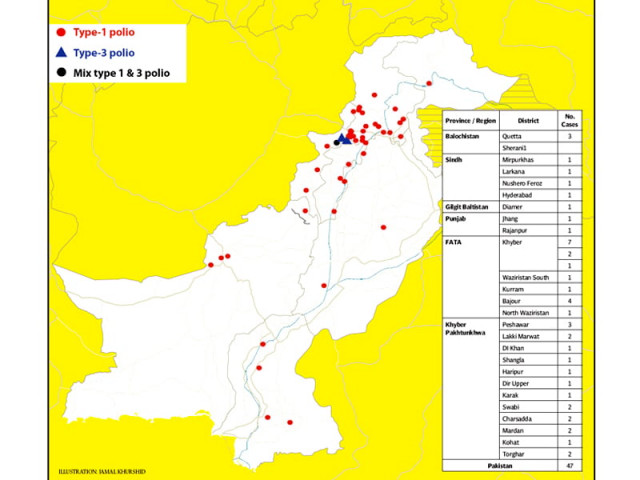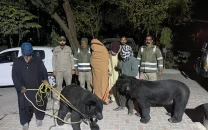World Polio Day: Number of polio cases falling, but Pakistan still far from green
Over 0.5 million of children were missed during the October polio campaign, including 45,000 refusals.

With the number of people refusing to have their children inoculated against polio reducing and the reported cases themselves showing a sharp decline compared to 2011, the prognosis for polio in Pakistan looks good.
In 2011, 154 cases were reported in 48 districts, while in 2012 so far, 47 cases have been reported from 27 districts. The refusals have also fallen by about 60%, when compared to 2011, according to officials.
But the battle against polio is far from over as admitted by Prime Minister’s focal person on Polio Eradication, Shahnaz Wazir Ali. “Pakistan is one of the only three countries where polio still exists,” she said.
A senior official working closely with the polio eradication programme said the recent sharp decline in the number of refusals and polio cases in the country should not be considered as the only indicator to gauge the performance of the polio eradication programme. “The only correct indicator to gauge performance is a reduction in the number of children repeatedly missed.”
According to the Pakistan Polio Eradication Initiative and UNICEF, over 0.5 million of children were missed in the October polio campaign which included 45,000 refusals.
The official said the biggest challenge is the polio teams’ inability to gain access to hundreds of thousands of children in North Waziristan and South Waziristan due to a ban by the Taliban.
An official working for the World Health Organisation (WHO) in Khyber-Pakhtunkhwa said the inability of polio teams in the two tribal regions to reach 300,000 children during every polio campaign is one of the “biggest hurdles” in their way.
“This year, 11 polio cases were reported from Bara in Khyber Agency,” he said, while revealing that 157,000 children remained unvaccinated in Khyber Agency since September 2009. Only children that made it to Jalozai Camp near Peshawar were given polio drops. The 2009-2012 inaccessibility in Khyber Agency resulted in the outbreak, he added.
When contacted at the regional headquarters of WHO in Cairo, Chief of the Polio Section for Pakistan, Dr Elias Durry said Khyber-Pakhtunkhwa is the biggest challenge in the fight against polio. “By mid-November, Karachi will have been polio-free for one complete year.”
Successes in Karachi and Quetta districts clearly demonstrate the capacity of the polio programme to knock out polio, he said. “[But] the outbreaks like the one in K-P stress the fragility of the success and the urgency to implement quality campaigns throughout the country.”
In 1994, about 23,000 children were either paralysed or killed by polio in Pakistan. Subsequent campaigns helped bring the number of polio victims down. But the downward spiral stopped in 2006, coinciding with rising militancy in the tribal region.
Published in The Express Tribune, November 2nd, 2012.



















COMMENTS
Comments are moderated and generally will be posted if they are on-topic and not abusive.
For more information, please see our Comments FAQ